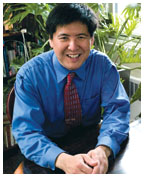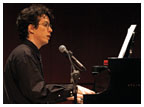May 14, 2008: Books and Arts
A primer on the brain
Sam Wang explains why we lose our keys but never forget how to drive
Musical interlude
Physics department’s 20-year tradition strikes a chord
PLOrk performs at Carnegie Hall debut
For a complete list of books received, click here.
Engaging in intellectual and physical pursuits is the best way to maintain healthy brain function later in life, says Sam Wang, a Princeton associate professor of molecular biology and neuroscience. (courtesy Bloomsbury USA) |
Reading
Room
A primer on the brain
Sam Wang explains why we lose our keys but never forget how to drive
When people find out that Sam Wang is a neuroscientist, they often pepper him with questions like: Do we really use only 10 percent of our brains? Does drinking kill brain cells? And will listening to Mozart make babies smarter? (The answer to all three is no.) With co-author Sandra Aamodt, editor-in-chief of the scientific journal Nature Neuroscience, Wang has answered those questions in Welcome to Your Brain: Why You Lose Your Car Keys But Never Forget How to Drive and Other Puzzles of Everyday Life. Published by Bloomsbury in March, the book provides an overview of how the brain works and debunks myths and ideas that are embedded in popular culture. Wang, an associate professor of molecular biology and neuroscience at Princeton, spoke with PAW’s Katherine Federici Greenwood.
What is the most widespread myth about our brains?
That we use only 10 percent of our brains. The earliest mention [of the myth] that we were able to find was in the writings of the great speaker but non-neuroscientist, Dale Carnegie. In his speeches Carnegie said this was a fact discovered by the elder of psychology, William James. But James wrote that we use only a small fraction of our brain’s full potential. That idea, which is inspirational and helps motivate people to try harder, turned into a very scientific-sounding statement by Carnegie. In fact, our brain is a very efficient device, and we use all of it.
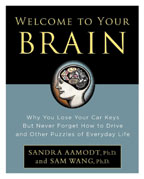 In
your book you address a question I often wondered about: Why can’t
we
tickle ourselves?
In
your book you address a question I often wondered about: Why can’t
we
tickle ourselves?
Because one thing our brains do is predict what a movement will feel like. Your body turns down the volume on sensations that are caused by your own movement. So any time your brain generates a command to, say, move your hand and touch your neck, it sends other information within your brain that says “I’m moving my hand” and that you may expect a sensation that feels like that. But when someone else touches you, you feel that sensation more strongly because you’re not generating a movement that predicts that sensation. The brain region that is probably involved in this is the cerebellum.
Why might someone forget where he put the car keys but remember something that happened when he was a child?
We think of memory as one thing that our brains do, but our brains have about half a dozen different types of memory that use different brain regions. So it’s possible to have trouble in one type of memory and to have less trouble in another type of memory. Short-term memory — such as keeping track of your car keys, recalling a phone number, or recalling a fact — begins to decline in people starting in their 30s. Short-term memory requires the hippocampus and other nearby structures. The hippocampus shrinks as you age, which may account for decline in function. Your long-term memories, such as things that happened at the age of 5, get stored elsewhere. It’s thought that factual memories get laid down in the hippocampus and then over time get transferred out to the cerebral cortex. Long-term memory is therefore stored in a more secure fashion, making it possible for a person to remember events clearly from many years ago while having difficulty with more recent events.
What can people do to maintain healthy brain function later in life?
Have an intellectually engaged lifestyle and undertake physical exercise.
People who engage in fitness training to get the heart rate up, and who
do intellectual work for a living or who have complex intellectual hobbies
like learning a language or bridge, are more likely to retain executive
function. Executive function, which begins to decline in people’s
70s and 80s, is a set of abilities including self-control, making plans
for the future, and decision-making. The more education you have, the
more likely it is you will maintain healthy brain function later in life.
Physical exercise increases blood flow to the brain and the amount of
energy available to the brain. The short slogan in the book is if you
do physical things for a living, you should get an intellectual hobby.
If you do intellectual things [for a
living], you should get a physical hobby. ![]()
For a complete list of books received, click here.
Professor of Physics Steven Gubser ’94 *98 performs Gershwin songs at the physics department recital in April. (Beverly Schaefer) |
Musical
interlude
Physics department’s 20-year tradition strikes a chord
By Maria LoBiondo
Much has been made of the connection between math and music — the idea that aptitude in one portends talent in the other — but that’s not what Laurel Lerner had in mind when she organized the first physics-department concert.
Lerner, the physics department’s graduate administrator and a piano teacher, simply saw an opportunity to share an interest beyond the heady thoughts on which most students and faculty members spent their days. The first informal talent show played three hours to a full house.
There was another packed house at the 20th Annual Physics Department Concert, which took place April 26 in Taplin Auditorium and offered 10-minute performances of selections from Bach and Gershwin to rock ’n’ roll.
“It’s like a potluck,” says graduate student and trumpeter Justin Brown, who performed Leroy Anderson’s “A Trumpeter’s Lullaby.” “It’s a casual event, with music from hobbyists to serious enthusiasts.”
Like a potluck, all musical offerings are welcome. Performers must be students or employees in the physics department. Eva Zeisky, the department’s Webmaster and a pianist who now does much of the concert’s organizing, estimates that 90 percent of the music is classical. Most people perform on piano, she says, but some sing and others have played guitar, digital horn, accordion, violin, and cello. There have been less common instruments over the years: a Chinese erhu, an Indian tabla, an electric clarinet.
Brown, who plays with the Univer-sity Wind Ensemble and with a local band, says music relaxes him and “allows me to use a different part of my brain.” His comment is mirrored by others, including Professor Steven Gubser ’94 *98.
Gubser, who performed during his Princeton graduate school days and
played Gershwin songs on piano this year, says the recital gives amateur
musicians like him the encouragement to keep practicing. And while he
thinks too much is made of the math-music connection, he does admit that
his music has a professional benefit: “When I’m excited about
something in physics, I often like to play the piano for a few minutes.
I’m not sure whether it helps me concentrate, but I enjoy it.”
![]()
Maria LoBiondo is a PAW contributor.
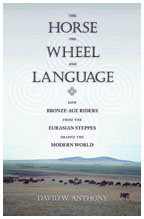 The
Horse, the Wheel, and Language: How Bronze-Age Riders from the Eurasian Steppes
Shaped the Modern World — David W. Anthony ’71 (Princeton
University Press). The author argues that Proto-Indo-European, an ancient
mother tongue from which are derived the languages that about half the
world’s population speak today, originated in southern Ukraine
and Russia. He attributes the spread of the language to the domestication
of horses and the invention of the wheel. Anthony is a professor of anthropology
at Hartwick College in Oneonta, N.Y.
The
Horse, the Wheel, and Language: How Bronze-Age Riders from the Eurasian Steppes
Shaped the Modern World — David W. Anthony ’71 (Princeton
University Press). The author argues that Proto-Indo-European, an ancient
mother tongue from which are derived the languages that about half the
world’s population speak today, originated in southern Ukraine
and Russia. He attributes the spread of the language to the domestication
of horses and the invention of the wheel. Anthony is a professor of anthropology
at Hartwick College in Oneonta, N.Y.
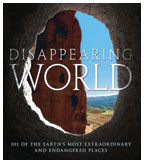 Disappearing
World: 101 of the Earth’s Most Extraordinary and
Endangered Places — Alonzo C. Addison ’87 (Collins).
The author provides miniprofiles of places of natural, historic, and cultural
significance
— including Kilimanjaro National Park and Arequipa, Peru —
that are endangered by both natural and man-made causes such as earthquakes
and overdevelopment. Addison serves as special adviser to the director
of the United Nations Educational, Scientific, and Cultural Organization
(UNESCO) World Heritage Center.
Disappearing
World: 101 of the Earth’s Most Extraordinary and
Endangered Places — Alonzo C. Addison ’87 (Collins).
The author provides miniprofiles of places of natural, historic, and cultural
significance
— including Kilimanjaro National Park and Arequipa, Peru —
that are endangered by both natural and man-made causes such as earthquakes
and overdevelopment. Addison serves as special adviser to the director
of the United Nations Educational, Scientific, and Cultural Organization
(UNESCO) World Heritage Center.
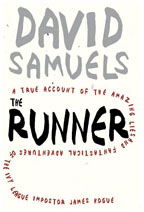 The
Runner: A True Account of the Amazing Lies and Fantastical Adventures of the
Ivy League Impostor James Hogue — David Samuels *93 (The
New Press). In this account of the drifter and petty thief who forged
his way into Princeton under the fake identity of Alexi Santana, a self-educated
ranch hand and elite runner, the author re-creates the real story of James
Hogue. Samuels is a frequent contributor to The New Yorker, where
sections of this book first appeared.
The
Runner: A True Account of the Amazing Lies and Fantastical Adventures of the
Ivy League Impostor James Hogue — David Samuels *93 (The
New Press). In this account of the drifter and petty thief who forged
his way into Princeton under the fake identity of Alexi Santana, a self-educated
ranch hand and elite runner, the author re-creates the real story of James
Hogue. Samuels is a frequent contributor to The New Yorker, where
sections of this book first appeared.
![]()
By K.F.G.
The Princeton Laptop Orchestra, shown performing last winter in Alexander Hall’s Richardson Auditorium, made its Carnegie Hall debut April 25. (Lorene Lavora, courtesy plork) |
PLOrk performs at Carnegie Hall debut
Sitting on pillows as they created music via their computers, speakers, and keyboards, eight members of the Princeton Laptop Orchestra brought their innovative music to a debut in Carnegie Hall on April 25. Dan Trueman, the ensemble’s co-founder and assistant professor of music, played the prelude to his composition, Silicon/Carbon: an anti-Concerto Grosso, on hardanger fiddle before the PLOrk musicians joined the American Composers Orchestra. The performance was part of the American Composers Orchestra’s Playing it UnSafe program, an initiative to explore highly experimental ideas.
The composers and orchestras performing in the program held open rehearsals that allowed the musicians to “respond to surprises [and] unexpected possibilities” and incorporate those elements into the final performance, explained Trueman. During Silicon/Carbon, PLOrk processes the sounds of the orchestra, “blending in seamlessly,” said Trueman, and at other times the “laptops act as a kind of funky metronome or beat box that the orchestra and conductor follow along with.” PLOrk musicians also play the laptops themselves as musical instruments, using the trackpads and the keys, and shaking and smacking the laptops like drums to make sounds.
PLOrk received a $238,000 Mac-Arthur Foundation grant to redesign and
further develop a mobile, computerized music lab, which it hopes will
enable students to make electronic music not just in rehearsal rooms,
but anywhere on campus. ![]()
By K.F.G.
MORE ONLINE, click here: See and hear how PLOrk makes music.

